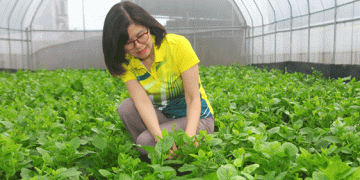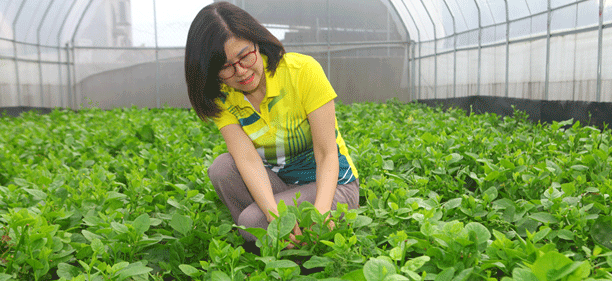The global organic food market is projected to reach $437.4 billion by 2026, growing at a CAGR of 12.2% (Statista, 2023). Consumers increasingly prioritize food safety, driven by concerns over pesticide residues and chemical contamination. In Vietnam, the organic sector is expanding rapidly, with government support for eco-friendly farming practices.
Mr. Vu Van Thanh, founder of TH Giao Yen Cooperative, recognized this trend after experiencing food poisoning from contaminated produce. Determined to provide safe vegetables, he adopted Japanese organic farming techniques, investing in greenhouses, automated irrigation, and imported organic fertilizers from the Netherlands and Japan.
Key Innovations in TH Giao Yen’s Model:
- High-Tech Greenhouses –
- 180 m² per unit, fully enclosed to block pests and mold.
- Automated irrigation with Htech filtration, removing toxins while adding alkaline ions for plant health.
- Strict “6 No” Standards –
- No pesticides, herbicides, GMO seeds, chemical fertilizers, growth stimulants, or preservatives.
- Premium Organic Inputs –
- Fertilizers imported from Japan, the Netherlands, and Belgium enhance soil fertility naturally.
Market Success & Expansion
TH Giao Yen’s vegetables reach:
- 5 international hotels & restaurants
- International schools
- 400+ loyal household customers in Hanoi
The cooperative plans to expand to 2-3 hectares, incorporating eco-tourism and educational programs to promote organic farming awareness.
Why Organic Farming is the Future
Organic farming is no longer a niche market—it’s a profitable, scalable business with growing demand. By adopting advanced greenhouse technology, strict organic protocols, and premium inputs, farmers can:
✔ Increase profitability (organic produce sells at 20-50% higher prices).
✔ Reduce environmental impact (no chemical runoff, healthier soil).
✔ Meet consumer demand for safe, traceable food.
TH Giao Yen’s success proves that sustainability and profitability go hand in hand.































